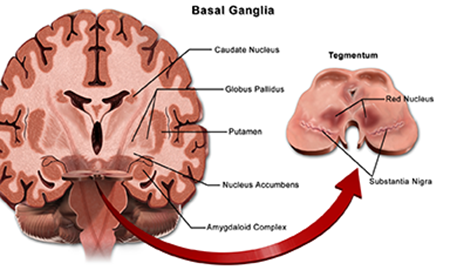Part 3 of 4

Parkinson’s disease stages
This is People and Parkinson’s – Part 3 and I will be going through the disease stages, causes and other considerations. Click here if you missed Part 1 and here if you missed Part 2.
Everyone who contracts PD will have differing symptoms which will be evident at different stages of the disease. The notion of people and Parkinson’s is that the main symptoms that are suffered are tremors and shaking. These are physical conditions, but what about the mental problems that people suffer like depression and panic attacks, anxiety and stress. Without a positive mental attitude and outlook PD sufferers will have difficulty coping with the physical symptoms of the disease which can also include pain in various parts of their body, overwhelming tiredness, constipation, sleeplessness etc.. These problems will have a dramatic impact on their lives as they try to come to terms with their condition on a daily basis.
 How quickly the condition will develop is random between different sufferers. Some will have mild symptoms for a long time and then the condition will speed up. Others may have serious symptoms for a while and then the illness will slow down.
How quickly the condition will develop is random between different sufferers. Some will have mild symptoms for a long time and then the condition will speed up. Others may have serious symptoms for a while and then the illness will slow down.
The condition will progress though, at varying speeds but as this happens, the amount of care and support required by each patient will have to re-evaluated. This also goes for the treatment that each patient is receiving. This treatment will have to be monitored to make sure the patient is having the best and most appropriate medication for the stage their condition is at. Many people though, tend to maintain a good quality of life with a limited amount of care and treatment.
Is PD hereditory?
There is no evidence to suggest that Parkinson’s is generally hereditory. In the majority of cases it is considered a non-genetic disorder. It is very unusual to find more than one close family member suffering from it. In a small number of cases though, a first-degree relative can have the disease and a low percentage of sufferers are found to have a form of Parkinson’s that occurs because of a mutation of one of several specific genes. Generally the most common form of Parkinson’s, is defined as ‘primary parkinsonism’ or ‘idiopathic parkinson’s’ which means there is no external identifiable cause of the condition.
What are the Causes of Parkinson’s Disease?
It is known that Parkinson’s occurs due to a loss of nerve cells in the mid brain, an area called the substantia nigra. These particular cells produce dopamine the loss of which affects the balance of it with acetylcholine, resulting in messages to muscles becoming jumbled. Why these nerve cells die seems to be a mystery to most medics and specialists in the field and many will tell you that the cause is unknown. Patients are often told…
…it is not known why these nerve cells die
There is, however, much evidence to indicate that metals such as aluminium can significantly contribute to the degeneration of the nervous system which occurs with PD. An autopsy study showed elevated levels of Calcium (Ca) and aluminium in Parkinson’s victims’ brains, compared to people with normal brains.(1) It is known that if Magnesium (Mg) is deficient in the body, it will allow Ca to migrate and calcify and can also adversely affect the proper function of hundreds of enzymes which need Mg as a cofactor. Metals such as aluminium, lead and cadmium can latch on to certain enzymes if Mg is depleated, thus preventing normal enzymatic activity or causing abnormal function leading to cell death.
The following statement, or something like it, is what PD patients are also often told…
…You may need to take more medication, leading to a lot of pills to manage.
This is a catch 22 situation. As symptoms worsen and Parkinson’s progresses, more medication is prescribed to try and alleviate the worsening conditions. This in turn gives way to more side effects which have to be addressed with more medication and so it goes on.
The antagonism concept.
Consuming plenty of nutrient minerals actually antagonizes, or prevents the absorption and utilization of toxic metals. Deficient diets, however, always result in toxic metal accumulation and poisoning.
 So why only drugs?
So why only drugs?
As advances in the treatment of Parkinson’s continue, the quality of life for people with the condition will hopefully improve but personally, I don’t think enough is being done to utilise natural nutrients and find out why and how this devastating condition happens. The emphasis is on drug therapy. Drugs have their place in our health when nothing else is viable but why are we not utilizing nutrients that have been proven to diminish symptoms often more effectively than drugs. Drugs are made from chemicals that are often unnaturally put together. They would not be in the body normally which leaves the patients’ health wide open to side effects. If the body can utilise what would naturally be in it’s makeup, then there is a better chance of getting relief from any disease without causing more havoc with unwanted side effects.
Many people with Parkinson’s lead active and fulfilling lives but how much better could these lives be if we were using natural vitamins and minerals to aid relief and perhaps avoid the disease altogether.
It is not easy to maintain a positive outlook when Parkinson’s sufferers can only look forward to worsening symptoms. Support and advice is in abundance on how to make the best of things whilst living with PD but more could be done. The drug companies are in control and it’s their drugs they want to push, certainly not some cheap natural nutrient which will give them zero profits, despite possibly being a better option than some of the lethal drugs touted by Big Pharma.

Not only do the Parkinson’s victims suffer, but so do their families and carers. This is the same for all of those who have come down with a debilitating illness. There is often hope from the simplest of nutrients but this isn’t even considered by most medics because all they know about is drugs and medical procedures that are often hit and miss, with patients commonly being used as guinea pigs.
Can I avoid contracting this disease?
Now there’s an interesting question. There is a concensus of opinion from the powers that be, that there is no cure for this disease and the only control or relief is by way of prescription drugs and medical procedures. Also, the estimated 75% of ‘idiopathic’ Parkinson’s sufferers are told by medics that the reasons for them contracting it is unknown. If the cause is unknown then there is little hope of finding a solution.
There are a few doctors and researchers though, who have come up with radical reasons as to why the majority of sufferers succcumb to Parkinson’s and more importantly, what can be done to drastically reduce our chances of being stricken by this illness.
This is what we will explore in the final part of this post. There are things you can do to help avoid this disease and there are things you can do to alleviate its symptoms if you already have PD.
What is amazing to me is that this addition to your medication regime is hardly ever suggested by our medics. Why is this? Are prescription drugs pushed by the drug companies in favour of natural remedies? Does Big Pharma put patients first or money first? Are there alternatives that will work just as well without the nasty side effects? Are drugs being used that are doing more harm than good?
The final part of this article will be published on Sunday 10th 2016 and will cover other ways to help avoid this disease or alleviate its symptoms if you are a sufferer. Please look in, read and comment. Your information is important to us, don’t be shy, let us know what you think and give others the benefit of your experience.
 If you have experiences of PD either as a patient, a loved one and/or carer, please let us know your take on this disease by commenting below. You may have information that can help other sufferers! Ches Power
If you have experiences of PD either as a patient, a loved one and/or carer, please let us know your take on this disease by commenting below. You may have information that can help other sufferers! Ches Power
- Yasui, M., et al. Calcium, magnesium and aluminum concentrations in Parkinson’s disease. Neurotoxicology, Vol. 13, Fall 1992, pp. 593-600
Spread the word!

Wow what an informative article on parkinson’s disease and I love the fact that you have divided it into a part one, two and three. I also really enjoyed the fact that you back up your claims with scientific study. Your writing is very personable and reflects to the reader that you have a great understnading or personal experience of parkinsons disease.
Hi there Jazzy and thanks for reading the article which was rather long I know. Your positive comments are gratifying and yes there has been a lot of research about magnesium and autoimmune diseases. Unfortunately, they seem to have fallen on stoney ground as pharmaceutical drugs gain momentum. I sincerely hope you and yours are lucky enough to be healthy but if not, magnesium can only do good as it is vital for the production of energy. It is a cofactor for hundreds of enzymes which won’t work without it. It is a relaxant for tight spasmic muscles, calms the mind and lightens the mood so ideal for depression and anxiety conditions. It’s also an anti toxin and protects the body from the damaging effects of aluminium, mercury, nickel etc.. Ches
Hi Chessie,
I must commend you on such a wonderfully written, insightful, thoughtful yet poignant article that you wrote about Parkinson’s disease. As I came across part 3 of your multi-part focus in this disease, I did take the time to go back and read Parts 1 and 2 written earlier.
You did an incredible job illustrating and explaining to the readers medically about Parkinson’s disease and from a scientific viewpoint exactly what it is and how it effects the body of one afflicted with it.
My grandfather, (mother’s side of the family) had Parkinson’s disease. He actually lived until age 84, dying in 1960 of pneumonia. I don’t remember him at all as I was not even 3 years old when he passed. Still from the stories told me throughout the years by my now deceased mom and aunt, (her sister) whenever I came over to his house I would play games of “hide and seek” with him. Although then he was pretty much confirmed to sitting in a chair, nevertheless to get his attention as a 2 year old boy I would tap him in the leg, run away to another part of the house all while saying “come catch me, granddaddy”! Of course really he could not and something as a young boy it is something that I never would have understood. In having a beautiful portraits of both he and my grandmother in my possession, probably taken around the year 1912 I do facially resemble my grandfather now. My mom, #9 out of 10 kids was born when he was in his mid-50’s, my grandmother then in her early 40’s. There was a 12 year gap in the ages between my grandfather and grandmother on that side of my family.
You are to be commended Ches for the work you did in this article, served to educate to your readers everything that is associated with Parkinson’s disease. Probably the most famous person in the world now afflicted with it for years is the former boxing heavyweight champion of the world Muhammed Ali. The actor Michael J. Fox, famous for his role in the mid-80’s movie series “Back to the Future” has it as well unfortunately.
There really is no cure for Parkinson’s yet. I gather that in your final and upcoming Part 4 of the series you will discuss possible remedies surrounding ones’ getting more magnesium into their diet.
Once again Ches this was such a brilliant article that you obviously spent a lot of time creating. It is easy to see that your goal in writing this 4 part article is to provide help and hope for those individuals or their loved ones who do suffer from Parkinson’s.
Jeff
Hi there Jeff and I’m gratified to hear from you that this post may hopefully be helpful to those many sufferers and their carers and loved ones. The stories told to you by your family about your grandfather are quite poignant and I suspect he had great pleasure in seeing his young grandson running around and at the same time being frustrated that he couldn’t get up and play with you.
What a horrid disease this is and those of us who are fit and well should be so grateful for our good fortune. I just hope that people who read the article will take heed. After all Mg poses no risk to take (unless you suffer from the 4 contra indications shown in Part 4). Unfortunately, the public have been misinformed about Mg (and Calcium) and I shall keep trying to bring it to the fore so that as many people as possible know about its properties and its importance in aiding a healthy and long life. Part 4 has just been published and can be found at People and Parkinson’s – Part 4
Good luck and good health always, Ches Power
Hello, thank you for spreading important information about Parkinson’s disease, because always new information is good to know to everybody, who has a contact with it.
As I heard, this particular disease can be stopped, just to be in the stage. People, who help themselves with exercises, deal with symptoms of Parkinson disease easier compare with those, who are inactive.
Magnesium plays big role treating Parkinson’s disease, because magnesium works for relaxation of muscles and controls entrance of calcium to cells.
I wish that your visitors would find an information about this disease and it would help them to make decisions when choosing ways how to deal with it.
All the best, Nemira.
Hello Nemira and thanks for reading the post. You seem to understand about how Magnesium works in the body and its influence on Calcium and that is very gratifying. Hopefully, none of your friends or loved ones have got this horrid disease but if you know of anyone who has, please give them the information about the benefits of Magnesium. The word needs to be spread to as many people as possible. If you want to read the last Part of this 4 part article you can find it here People and Parkinson’s – Part 4
Good health to you always. Ches Power